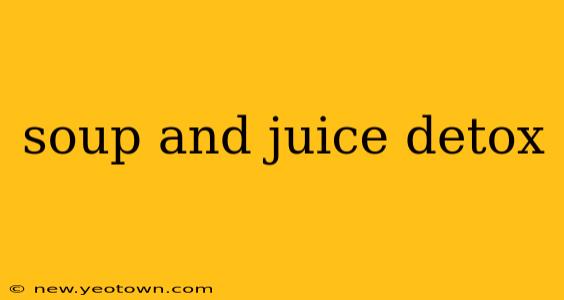Have you ever felt the need to hit the reset button on your health? A sluggish feeling, persistent bloating, or just a general lack of energy can leave you yearning for a healthier you. Many turn to detox programs, and the soup and juice detox is a popular choice. But is it all it’s cracked up to be? Let's explore the world of soup and juice detoxes, delving into the benefits, potential risks, and answering your burning questions.
This isn't just another quick guide; this is a journey into the heart of this popular cleansing method, exploring its effectiveness, potential drawbacks, and how to approach it safely and responsibly. We'll be peeling back the layers to reveal the truth behind this trending health practice.
What is a Soup and Juice Detox?
A soup and juice detox, as the name suggests, involves consuming only soups and juices for a specific period, typically ranging from a few days to a week. The rationale behind it is to give your digestive system a break, flush out toxins (a somewhat debated concept), and potentially lead to weight loss. Proponents believe that it helps cleanse the body by eliminating processed foods, sugar, and unhealthy fats, allowing your body to focus on repair and rejuvenation.
However, it's crucial to understand that the scientific community doesn't uniformly support the concept of "detoxification" in this context. Your liver and kidneys already perform this crucial function. A detox diet might offer some temporary benefits, but it's not a replacement for a healthy lifestyle.
Does a Soup and Juice Detox Really Work?
This is the million-dollar question. The truth is, while a soup and juice detox might lead to short-term weight loss due to reduced calorie intake, it's often unsustainable and may not offer lasting health benefits. The weight lost is usually water weight and will likely return once you resume your normal diet.
More importantly, the potential benefits are often overshadowed by the risks involved, as we'll explore later. Focusing on a long-term, balanced diet and lifestyle changes will yield far more sustainable and positive results.
What are the Benefits of a Soup and Juice Detox?
While the overall effectiveness is debated, some potential benefits might include:
- Increased Vegetable and Fruit Intake: A well-planned soup and juice detox forces you to consume a high volume of fruits and vegetables, providing essential vitamins and minerals.
- Short-Term Weight Loss: The restricted calorie intake can lead to temporary weight loss, primarily water weight.
- Improved Digestion (Potentially): For some individuals, a temporary break from processed foods might temporarily ease digestive discomfort.
What are the Risks of a Soup and Juice Detox?
The risks associated with a soup and juice detox can be significant, and it’s essential to be aware of them:
- Nutrient Deficiencies: Relying solely on soups and juices for an extended period can lead to deficiencies in essential nutrients, such as protein and healthy fats.
- Low Energy Levels: The restricted calorie intake can result in significant fatigue and weakness.
- Headaches and Dizziness: These symptoms are common due to the lack of essential nutrients and blood sugar fluctuations.
- Muscle Loss: Without adequate protein intake, your body may start breaking down muscle tissue for energy.
- Unsustainable Lifestyle Change: The restrictive nature of the detox often leads to a yo-yo effect, where the weight is regained once normal eating habits resume.
How Long Should a Soup and Juice Detox Last?
Most experts recommend against extended soup and juice detoxes. A short-term cleanse of one or two days might be manageable for some, but anything longer could pose serious health risks. It's crucial to consult a doctor or registered dietitian before embarking on any detox program.
Is a Soup and Juice Detox Safe for Everyone?
No, a soup and juice detox is not safe for everyone. Individuals with underlying health conditions, such as diabetes, kidney disease, or eating disorders, should absolutely avoid it. Pregnant or breastfeeding women should also consult their doctor before considering any detox.
What Should I Eat After a Soup and Juice Detox?
The key is to gradually reintroduce solid foods into your diet. Start with easily digestible foods like fruits, vegetables, and lean proteins. Avoid processed foods, sugary drinks, and excessive amounts of unhealthy fats. A gradual transition will help your body adjust and prevent any digestive upset.
Can I do a Soup and Juice Detox for Weight Loss?
While you might experience short-term weight loss, it's not a sustainable or healthy way to achieve long-term weight management. Focus on a balanced diet, regular exercise, and sustainable lifestyle changes for lasting weight loss.
This detailed exploration of soup and juice detoxes hopefully provides a balanced perspective. While some might find temporary benefits, it’s crucial to understand the potential risks and prioritize a balanced, healthy lifestyle over quick fixes. Remember, sustainable health is a marathon, not a sprint.

